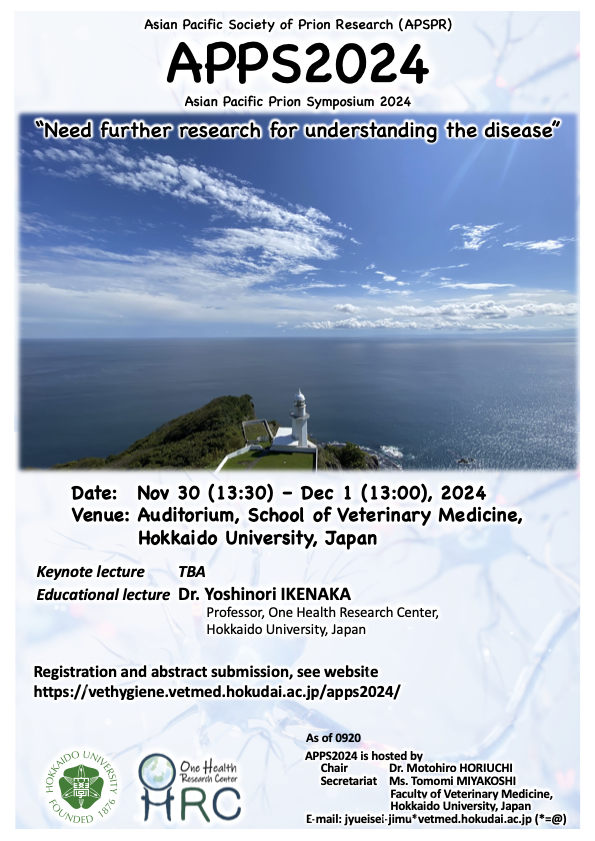Asian Pacific Society of Prion Research (APSPR)
Asian Pacific Society of Prion Research (APSPR)
News
●APPS2025 meeting●New Vice-President
・Dr.Atsushi Kobayashi of Nagasaki University has become new Vice-President of APSPR.
●New President
・Dr. Motomasa Tanaka of RIKEN Center for Brain Science has become new President of APSPR.
●APPS2024 meeting
・APPS2024 meeting will be held on November 30 (Sat) - December 1st (Sun), 2024, at School of Veterinary Medicine, Hokkaido University, organized by Dr. Motohiro HORIUCHI.
・For details, please visit the APPS2024 website
●APPS2023 meeting
・APPS2023 meeting will be held on November 9 (Thu) -10 (Fri), 2023, at Tokyo International Forum, organized by Dr. Nobuo Sanjo.
・Deadline of abstract submission will be September 30 (Sat), 2023.
・For details, please visit the APPS2023 website
●New Vice-President
・Dr. Motomasa Tanaka of RIKEN Center for Brain Science has become new Vice-President of APSPR.
●New President
・Dr. Ryuichiro Atarashi of Miyazaki University has become new President of APSPR.
●APPS2022
Dear APSPR Members
We are pleased to announce that APPS2022 will be held as a hybrid on-site
and web-based event.
We encourage young people to actively register for general abstracts and use
them as opportunities to present their research.
In addition, we encourage young people who participate on-site to apply for the Travel Award.
*****************************************************************************
Asia Pacific Prion Research Meeting 2022: https://apps2022.jp/
Date: Thu, 15 Dec 2022 13:00-18:00, Fri, 16 Dec 2022 9:00-12:00
Place: Shonan Health Innovation Park (CS Building Auditorium)
Access: https://www.shonan-health-innovation-park.com/en/access/
Registration fee: Free
Program: In progress
The deadline for general abstracts is Sunday, November 6.
*****************************************************************************
Please visit APPS2022 homepage and register to join the meeting!
●APPS 2021 online
・Thank you all for your kind understanding and mutual agreement to another postponement,
this time of this year’s APPS in Beijing.
As new mutants of SARS-CoV2 are spreading around the world,
making overseas travel extremely difficult,
but I hope you are all well and your prion research is going well too.
Let us hope we can all meet again at APPS-Beijing next year.
Prof Dong and Dr Shi will tell us of their new plans for APPS2022 on the website soon.
An alternative option would be to hold APPS online. Here,
we announce the “APPS2021online” will be held on November 7.
Click here.
●APPS 2020 meeting
・In light of the SARS-CoV2 pandemic, we have decided to cancel this year's annual meeting of APPS. Next year’s schedule will be announced on the APPS2020 website.
(The new schedule for APPS 2021will be in October 21-24, almost the same season with APPS 2020.)
(Updated on September 19, 2024)
Asian Pacific Society of Prion Research (APSPR)
We have experienced over the last 20 years that prion diseases pose major threats to food safety through the prevalence of bovine spongiform encephalopathy (BSE) and the occurrence of variant Creutzfeldt-Jakob disease. We also have recognized again that prion diseases pose important threats to medical safety because of the frequent occurrence of Creutzfeldt-Jakob disease associated with dura mater transplantation. Marked progress has been made in the last 20 years in the elucidation of the pathology of prion diseases as well as prion formation mechanisms, the development of diagnostic technologies for prions, and the development of technologies for prion inactivation. However, a long period of progress may unfold before prion diseases can be overcome.The disease occurs sporadically in most human patients, although the causes and predisposition to susceptibility remain to be known. Basic studies of therapeutic and preventive measures have been actively undertaken, but neither measures to prevent disease onset nor feasible measures to halt the progress of the disease completely have been discovered. In animals, prion disease (chronic wasting disease) is still prevalent in fee-ranging deer and elk, which are therefore difficult to contain. Whereas typical BSE has been nearly exterminated in cattle because regulations on feed worked, atypical types of BSE still occur sporadically. Scrapie has been tried to be overcome by bleeding sheep with the scrapie-resistant genotypes, although atypical scrapie occurs in such sheep.
Phenomena similar to prions have been identified in the pathogenic proteins of various other neurodegenerative diseases and amyloidoses, expanding the prion concept. It has not been concluded whether the pathogenic proteins of these diseases also threaten food safety or medical safety in the same way that prions do, although it poses a very important question. Because the morbidity of these diseases increases along with aging, the diseases can pose severe difficulties for medical safety in countries with aging populations.
The earnest hope of the APSPR is that a new breakthrough will be born from more active information exchange and joint studies via close interaction of many researchers throughout the Asian Pacific region who are interested in prion and prion-like phenomena. We also sincerely wish that the APSPR will be the place for the exchange of many young-generation researchers supporting the conquest of these diseases. For these purposes, the APSPR aims to be the platform of the Asian Pacific region to contribute to the progress of research, education, diagnosis, and medical care for fields in which prion and prion-like proteins are involved. We hope that concerned persons will make good use of the APSPR in equal partnership, transcending the constraints imposed by field designations and national boundaries.
December 2015
President of the APSPR
